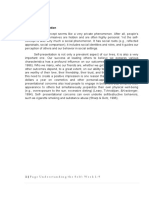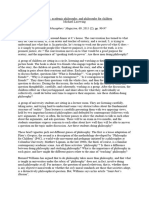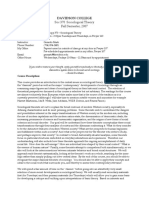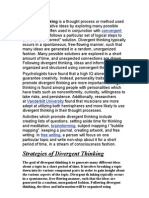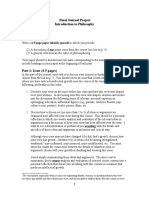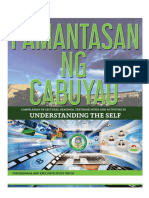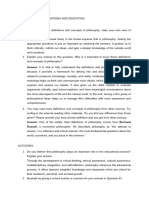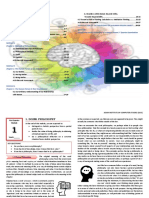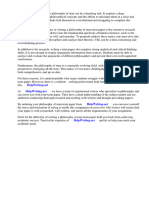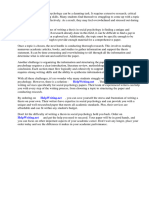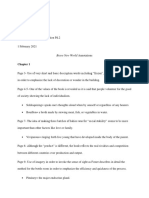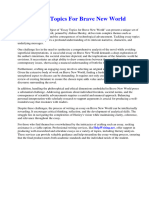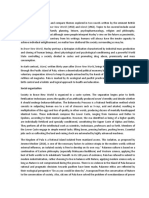30-1 Intro
30-1 Intro
Uploaded by
wefrghnjCopyright:
Available Formats
30-1 Intro
30-1 Intro
Uploaded by
wefrghnjOriginal Title
Copyright
Available Formats
Share this document
Did you find this document useful?
Is this content inappropriate?
Copyright:
Available Formats
30-1 Intro
30-1 Intro
Uploaded by
wefrghnjCopyright:
Available Formats
Perspectives on
Ideology
Introduction
Any group of people—a society—that has ever had the luxury of
being able to think about its existence eventually arrives at a general
understanding of how the world is and how the world ought to be.
Such an understanding can be called an ideology. Ideologies grow out of
the honest and serious contemplation of several fundamental questions:
• What are humans like, and why do they act as they do?
• What is the nature of society?
• What is the role of the individual in society?
You will find many different answers to these questions in this
book—some answers given by individuals and some found in ideologies.
Your task will not be to decide which one is “right,” but to think
carefully about whether or not any given ideology is the best way
to understand the world. To accomplish this, you will examine and
consider the results of ideologies that people have embraced in the past
and today. By the time you finish this book, you will be in a position
to reassess your own relationship with society and consider to what
extent you should embrace an ideology as a way to guide your
decisions and actions as a citizen.
▲
Figure I-1
How does ideology affect the choices
you make?
4 Perspectives on Ideology: Introduction
Points of View and Perspectives
As you make your way through this book, you will come across
various points of view and perspectives regarding ideology. Keep in
mind that, for the purpose of common understandings in this
resource, a point of view represents an individual’s opinion and is
based on that individual’s personal experience; a perspective reflects
the outlook of a particular group of people with the same age,
culture, economics, faith, language, or other shared quality. Exploring
a variety of points of view and perspectives on ideology will help you
recognize and develop your own point of view. It will also give you a
more comprehensive understanding of ideology than you would have
if you studied it from only one perspective.
The mission of Social Studies is to make sense of the human
condition. Social Studies asks, “Why do people do the things they do
with each other, for each other, and to each other?” Social Studies tries
to unravel the central human concerns about the purposes of life, the
best ways of living with others, and the best ways of relating to the
world around us.
Social Studies: An Issues-Based Discipline
Social Studies is an issues-based discipline. This means that it begins its
study at the point where differences of opinion or interpretation
emerge. People often take their perceptions to be reality, and yet
different people frequently have different perceptions of the same Why So Many Quotes?
events. There may be disagreements and seemingly irreconcilable views Because Social Studies focuses on
of how things should be. However, it is essential to the project of these very differences and
Social Studies that we carefully, thoughtfully, and respectfully listen to perspectives, you will notice that
these differences and study the many possible ways to address these quotations from many thinkers are
concerns. This involves, in part, developing the habit of mind that included in this book. Their quotes
withholds judgment, remains open for more information, and strives are meant to show, first of all, the
for deeper understandings of the social creature we call “human.” universality of these fundamental
With this general description of Social Studies in mind, teachers questions. The concerns of this course
and students of Social Studies are reminded that when controversy may be new to some but they have
arises in the classroom, it is important to respect the views of fellow been the concerns of people across
students, be sensitive to the effects of our words on others, empathize the ages and throughout many
with the potential pain of others around us, and identify with others. cultures. The words of these thinkers
The well-known phrase “walking in another person’s shoes” is well are also meant to invite a response—
known for a reason: it is essential not only to be aware of our your response. On occasion, they will
differences but also to acknowledge our common humanity. We are all provoke you and encourage you to
vulnerable. We are all social creatures who need one another. Mutual think more deeply about the issues
respect must colour all aspects of our study of Social Studies. raised in this textbook.
Part 1 Issue: To what extent should ideology be the foundation of identity? 5
Inquiry-Based Learning
Every chapter following this introduction is built around a Chapter
Issue related to ideology. To aid you in exploring this issue, each
chapter is divided into sections. Each section offers you an opportunity
to answer a Question for Inquiry related to the Chapter Issue and
provides you with exploration of some key concepts to help you
explore these questions. Some key supporting terminology is also
provided to help you understand the key concepts and questions
presented. The inquiries you pursue in this book will help you come to
your own informed opinions about issues related to ideology. By the
end of the book, you will be ready to develop an informed position on
the Key Issue for this course: To what extent should we embrace an
ideology?
In each of the four parts of this book, you will also explore a
Related Issue that will help you take an informed position about the
Key Issue for this course. Read each of the four issues in the diagram
on the opposite page. Which one do you think will interest you most?
Which one do you think is most relevant to your life?
As you read through each chapter, you will find many cross-
references to concepts, people, or events you were introduced to
earlier. Use these cross-references to assist in your inquiry and to see
the interrelated nature of issues and concepts throughout the resource.
Two extensive indexes are also provided at the back of the book. One
index lists and locates all the important terms, concepts, and people in
the resource; the other provides a list of the names of organizations,
institutions, and people mentioned in the resource. These indexes are
meant to help you locate information quickly as you engage in the
various tasks and activities throughout your Social Studies course.
Each chapter ends with a section designed to extend the inquiry of
that chapter. The tasks suggested are often extensive research inquiries
or preparations for debates or other presentations. These activities may
require significant time commitments. You will not be expected to
complete all these activities. Your teacher will determine which
assignments are most suitable and viable for your class.
Finally, keep in mind that Social Studies is as much about developing
the skills of inquiry, critical thinking, participation, and communication
as it is about acquiring concepts and developing informed positions.
Some of the essential skills required of active and responsible citizenship
are addressed in the Skill Path feature of each chapter. Each Skill Path
assignment is designed to give you opportunities to refine essential skills
related to the Chapter Issue and the Questions for Inquiry for that
chapter.
6 Perspectives on Ideology: Introduction
nship and Identity
Citize
▲
Figure I-2
Multiple
Perspectives
Part 1: Ideology
and Identity Part 2: Resistance
to Ideology
To what extent should
ideology be the To what extent is
foundation resistance to liberalism
of identity? justified?
Key Issue:
Multiple To what extent Multiple
Perspectives should we embrace Perspectives
an ideology?
PAUSE AND REFLECT
Part 4: Ideologies Part 3: Viability
and Individual Actions of Ideology
Our country is based on
To what extent should To what extent are
my actions as a citizen the principles of ideologies that accept certain
be shaped by an liberalism viable? ideas: freedom of speech, the
ideology? democratic process, the right to
Multiple
Perspectives associate with whomever you
choose, and so on. How
Citize
ns hip and Identity important are these ideas to
you? Can you imagine living in
a country that did not uphold
these ideas?
The Power of Ideologies
In the mid-20th century, two novels appeared that have had a great
influence on discussions about human nature and the role of ideology in
modern society. Both novels describe dystopias—fictional societies that
are deliberately portrayed as negative—where ideology is used to control
an unwitting population.
War is Peace, Ignorance is Strength, Freedom
is Slavery
In George Orwell’s novel Nineteen Eighty-Four (1949), “War is Peace,
Ignorance is Strength, Freedom is Slavery” are the three slogans of the
government of Big Brother. In this fictional world where there are only
three countries, Oceania, Eurasia, and Eastasia, Oceania is a totalitarian
society led by Big Brother that censors people’s behaviour, even their
thoughts.
Part 1 Issue: To what extent should ideology be the foundation of identity? 7
▲
Figure I-3
Winston Smith, the central character in
Nineteen Eighty-Four, works under the
watchful eye of Big Brother as he
changes old newspaper records to match
the new truth as decided by the Party.
Community, Identity, Stability
In Aldous Huxley’s novel Brave New World (1932), “Community,
Identity, Stability” is the motto of the utopian World State. Here
1. When Postman talks about the fears everyone is provided for and there is no violence. Thinking, art,
of Orwell and Huxley, he is talking originality, and philosophy are simply forbidden. Instead, people take a
about two very different views of drug to ensure that they never feel depressed, and the government
human nature. What are they? strictly controls reproduction.
2. The mottoes of the two societies American social critic Neil Postman compared the respective
(in Nineteen Eighty-Four and Brave dystopias of Orwell and Huxley:
New World) are deliberately ironic.
What do these mottoes tell you What Orwell feared were those who would ban books. What Huxley
about the way Orwell and Huxley feared was that there would be no reason to ban a book, for there would
think society should or should not be no one who wanted to read one. Orwell feared those who would
be run? deprive us of information. Huxley feared those who would give us so
3. If you were to write the great much that we would be reduced to passivity and egoism. Orwell feared
dystopian novel of the future, what that the truth would be concealed from us. Huxley feared the truth would
would it be about? How would your be drowned in a sea of irrelevance. Orwell feared we would become a
society operate? Think about the captive culture. Huxley feared we would become a trivial culture,
trends in society that you would preoccupied with some equivalent of the feelies, the orgy porgy, and the
want to satirize and criticize. What centrifugal bumble puppy.* As Huxley remarked in Brave New World
would your novel say about your Revisited, the civil libertarians and rationalists who are ever on the alert
view of human nature? to oppose tyranny “failed to take into account man’s almost infinite
appetite for distractions.” In 1984, Orwell added, people are controlled by
inflicting pain. In Brave New World, they are controlled by inflicting
pleasure. In short, Orwell feared that what we fear will ruin us. Huxley
feared that what we desire will ruin us.
*pleasant distractions and amusements in Brave New World
—“Foreword”, from Amusing Ourselves to Death by Neil Postman,
copyright © 1985 by Neil Postman. Used by permission
of Viking Penguin, a division of Penguin Group (USA) Inc.
8 Perspectives on Ideology: Introduction
Understanding Humans and
Societies through Ideologies
What are humans like, and why do they act the way they
do? What is the nature of society? What is our role as
individuals in society? These are big questions, but they
are not new questions. For centuries people have spent
time thinking about these questions and, quite often, their
responses take the form of an ideology. In the words of
British literary critic and Marxist activist Terry Eagleton,
What persuades men and women to mistake each other from
time to time for gods or vermin is ideology. One can
www.CartoonStock.com
understand well enough how human beings may struggle
and murder for good material reasons—reasons connected,
for instance, with their physical survival. It is much harder to
grasp how they may come to do so in the name of something
as apparently abstract as ideas. Yet ideas are what men and
women live by, and will occasionally die for.
—Terry Eagleton, Ideology: An Introduction
(London: Verso, 1991), p. xiii.
Figure I-4 ▲
One view of what really makes humans
Ideas are important because they are, as the quote above suggests, human is the awareness of their own
the reason why people act in certain ways. In order to become an existence. “Why do we exist?” and
informed, responsible, and active citizen, you need to be able to “What is the meaning of life?” are
questions people have thought about
understand and evaluate government policies and actions, and
throughout the ages. What would your
develop informed responses to local, national, and global issues. initial response be to this boy’s
Studying the various ideologies and responses to ideologies that will statement?
be presented to you throughout this text is your opportunity to “try
them on” to see if they fit you.
Consider the following quotes about humans:
Humans can learn to like anything, that’s why we are such a successful
species. You can drop humans anywhere and they’ll thrive—only the rat
does as well.
—Jeannette Desor (research scientist at General Foods),
quoted in Ellen Ruppel Shell, “Chemists whip up a tasty mess
of artificial flavors.” Smithsonian, 17, 2 (May, 1986): pp. 78–85.
An individual has not started living until he can rise above the narrow
confines of his individualistic concerns to the broader concerns of all
humanity.
—Martin Luther King Jr, American civil rights leader,
winner of the 1964 Nobel Prize for Peace
Part 1 Issue: To what extent should ideology be the foundation of identity? 9
It has been said that man is a rational animal. All my life I have been
searching for evidence of this.
—Bertrand Russell, British philosopher,
mathematician, political activist and social reformer,
winner of the 1950 Nobel Prize for Literature
Man is a goal-seeking animal. His life only has meaning if he is reaching
out and striving for his goals.
—Aristotle, Greek philosopher of the 4th century BCE,
made important contributions to the development of
logic and the sciences, tutored Alexander the Great
The belief in a supernatural source of evil is not necessary; men alone are
quite capable of every wickedness.
—Joseph Conrad, late–19th-century sea captain
and writer, celebrated for his novels and short
stories about colonialism and human nature
These quotes are attempts at capturing an ideology in a few words,
sometimes humorously. Based on your present opinions and beliefs,
organize the quotes from what you consider the most true to the least
true.
• Why did you put them in that order?
• What is it about each quote that you agree with or do not
agree with?
• Try to write your own ideology about human nature in one or
two sentences.
• What did other students in your class write down?
• Can you come up with a class ideology?
What Are Humans Like?
Have you ever read a newspaper article, or seen something in a movie
or television show, that made you wonder, “How could someone do
that to another human being?” History is full of cases of inhumanity—
the Crusades, the Holocaust, the actions of the Ku Klux Klan—and
barbaric behaviour still goes on today. But history is also full of acts of
kindness and compassion. There have always been people such as
Mahatma Gandhi or Norman Bethune who have devoted themselves
to helping others and there are many charities devoted to helping
others in various ways. Each person or group acts based on its
ideology, and every ideology attempts to answer the question “What
are humans like?”
Mark Twain wrote, “Man is the only animal that blushes. Or needs
to.” Why do you think Mark Twain thought this way about people? Write
down a list of all the qualities or characteristics that you think make
10 Perspectives on Ideology: Introduction
▲
Figure I-5
What views about human nature are
explicit and implicit in this cartoon?
www.CartoonStock.com
humans human. How many of these characteristics are ideological, and
how many are biological?
Thinking about what humans are like and what they are capable of
is something that people have done for centuries. Philosophers,
scientists, politicians, religious leaders, comedians, singers, writers, and
others have offered us their ideas about humanity. Consider the
following quotes:
Peace by persuasion has a pleasant sound, but I think we should not be
able to work it. We should have to tame the human race first, and history
seems to show that that cannot be done.
—Mark Twain, popular 19th-century American writer and satirist
Men are cruel, but Man is kind.
—Rabindranath Tagore, early 20th-century Bengali poet,
novelist, and lyricist, winner of the 1913 Nobel Prize for Literature
It is human nature to think wisely and act foolishly.
—Anatole France, French writer, member of the French
Academy, and winner of the 1921 Nobel Prize for Literature
Our true wealth is the good we do in this world. None of us has faith
unless we desire for our neighbours what we desire for ourselves.
—Mohammed, prophet of Islam, 6th to 7th century CE
• What is the message in each of these quotes?
• Which of these quotes do you agree with most?
Part 1 Issue: To what extent should ideology be the foundation of identity? 11
Clearly there is no easy answer when considering what humans are
like, but ideologies are a way to explore the possible answers to this
question.
What Is the Nature of Society?
The definition of a free society is a society where it is safe to be unpopular.
—Adlai E. Stevenson, United States Ambassador
to the United Nations
Our modern society is engaged in polishing and decorating the cage in
which man is kept imprisoned.
—Swami Nirmalananda, Hindu Swami
These two quotes both address the question “What is the nature of
society?” There are many answers to this question, and you have only
to read newspapers from around the world to figure out that there are
many different versions of society out there. Some societies are built on
the principles of peace and goodwill, while others are built on tyranny
and fear. Ideologies are the foundations on which all societies are
structured, for better or for worse, because ideologies are ways of
understanding how we should interact with one another.
Part of examining the nature of society is determining whether you
view it from an individualist or a collectivist standpoint. Individualism
is a current of thinking that values the freedom and worth of the
individual over the security and harmony of the group. Collectivism is
a current of thinking that values the goals of the group and the
common good over the goals of any one individual. For example, in
most places in Canada it is illegal to smoke in restaurants. Where do
you stand on this issue? Is it a bad policy that is unfair to the individual
smoker, who should be able to smoke wherever he or she pleases? Or
is it a good policy that protects the health and well-being of non-
smokers, who shouldn’t have to breathe in second-hand smoke? In
Chapter 1 you will make a Beliefs and Values Inventory to determine
whether you lean toward an individualist or a collectivist viewpoint.
In a capitalist society such as Canada’s, the focus is often on
personal wealth: How much do you make? What car do you drive?
Which designer’s clothes do you wear? But capitalist societies always
have desperately poor people living among wealthy people. Examining
the nature of society means questioning the extent to which this
individualist approach or a collectivist approach is best. While studying
the various ideologies in this book, you will encounter many people
who do not subscribe to the values of materialism. For example, the
Mi’kmaq [MIG-mah] people (sometimes referred to as the Mi’kmaw,
as seen in the quotation by Battiste and Henderson) have a very
different version of society:
12 Perspectives on Ideology: Introduction
Mi’kmaw people share an alternative vision of society.
While it is compatible with universally recognized human
rights, its stress is on wholeness and relationships, in N
particular on the responsibilities among families, clans,
communities and nations. At the minimal level, Mi’kmaw Kespek
Epekwitk Aq Piktuk
Last Water
Lying in the Water and
thought teaches that everyone and everything are part of a the Explosive Place
whole in which the parts are interdependent on each other.
Unama’kik
Each person has a right to a personal identity as a member Siknikt Mi'kmaq Territory
Drainage
of a community but also has responsibilities to other life Area
forms and to the ecology of the whole. Thus Mi’kmaw
thought values the group over the individual and the Eskikewa’kik
Skin Dressers
extended family over the immediate or biological family. Territory
—Source: Marie Battiste and James Youngblood Kespukwitk
Sipekni’katik
Last Flow
Henderson, Protecting Indigenous Knowledge Wild Potato Area 0 50 100 km
and Heritage: A Global Challenge
(Saskatoon: Purich Publishing, 2000), p. 55. Original source: drawn by Mike Martin for Native Council of Nova Scotia Mi’kmaq
Language Program, PO Box 1320, Truro, Nova Scotia B2N 5N2
Certainly in Canada there are many people who
value the community’s well-being over their own and Figure I-6 ▲
devote their time, money, and energy to helping others. The traditional territory of the Mi’kmaq.
Then again, striving for individualism is not necessarily a bad thing. How might location and sense of place
The influential 19th-century German philosopher Friedrich Nietzsche have shaped the Mi’kmaq’s beliefs and
wrote, values? Analyze some of the place
names on the map to guide your
The individual has always had to struggle to keep from being overwhelmed response.
by the tribe. If you try it, you will be lonely often, and sometimes frightened.
But no price is too high to pay for the privilege of owning yourself.
However, many people have argued that striving for individual goals
alone is not the way to achieve real freedom and progress. Martin
PAUSE AND REFLECT
Luther King Jr said “An individual has not started living until he can rise
above the narrow confines of his individualistic concerns to the broader At this point in your life, which
concerns of all humanity.” As an American civil rights leader of the do you value more: individual
1960s, King recognized that the cause of his people would be furthered goal attainment (getting ahead
by working together rather than suffering apart. The power of people for yourself) or collective well-
working together has been proven throughout history, an idea very well being (doing things for others)?
put by British musician John Lennon: “If everyone demanded peace Write down one pro and one
instead of another television set, then there’d be peace.” con for each side of the
As you read this text and think about the nature of society and argument. Can there be a
how it can be structured, think about the type of society you would balance between the two, or
make if you were creating an ideal society. Write down some points does it have to be one or the
now, and come back to your list throughout the course. At the end of other?
the course, evaluate how or if your idea of an “ideal society” has
changed. Make another list of contributions you can make to the
society you live in now that would make it more like your ideal society.
Part 1 Issue: To what extent should ideology be the foundation of identity? 13
Figure I-7
▲
What Is Our Role in Society?
Which of these images do you identify Look closely at the photographs in Figure I-7. Which one best captures
with? Do any of them capture what you
the way you see your future? What is it about that photo that appeals
think your role as a citizen is or will be?
Are there other aspects of citizenship to you? Thinking about our role in society is the third question that
that are not represented here? Make a list ideologies help us answer. It is a complex issue that usually reflects our
of all the ways someone can be an thinking about human nature and the nature of society. Our society is a
active, informed, and engaged citizen. democracy, and as such depends on citizen participation. However, in
Which do you do now? Which do you
order to participate in a democratic society, people need to understand
plan to do in the future?
not only human nature and society, but also what it means to be a
citizen and what a citizen’s role in society should be.
14 Perspectives on Ideology: Introduction
One of the earliest people to think about our role in society was the PAUSE AND REFLECT
Greek philosopher Plato, who lived in the 4th century BCE. Plato
believed that the community is best served by each citizen doing Do you see any flaws in Plato’s
whatever it is that he or she does best. The best builders should build; theory? Can you think of
the best farmers should farm; and the best ruler should rule. Plato based instances where his theory
his arguments on the belief that humans are not created equal in gifts would not hold true?
and talents. Some people are good at making decisions and others are
not. Some people are good at guarding, and others are better at making
bread. To Plato, your role is determined by your natural abilities.
Your role in society is more than just choosing a career, though.
Our roles in society have to do with purpose: What is the purpose we
serve in this world? The Dalai Lama has said that “Our prime purpose
in this life is to help others.” What is your reaction to his position? If
helping others is our prime purpose, then there must also be a
secondary purpose (and maybe even a third and fourth purpose). The
Mi’kmaq people believe that the individual has responsibilities to the
collective; that is, the individual’s purpose is to better serve the
community.
In this collective, each person has both rights and advantages from being
part of the whole but also has obligations and responsibilities that define
membership and citizenship…As one understands oneself—spiritually,
mentally, physically and emotionally—one becomes centered and focussed,
and thus becomes a vital force in enabling others to do the same.
—Source: Marie Battiste and James Youngblood Henderson, Figure I-8 ▲
Protecting Indigenous Knowledge and Heritage, p. 56. The Dalai Lama is the spiritual leader of
the world’s Tibetan Buddhists. He has
been a vocal supporter of Tibetan
Both Plato and the Mi’kmaq bring the idea of citizenship into their independence from China and is the
ideologies. Your role in society, especially a democratic society such as head of the Tibetan Government in
Canada’s, is determined in part by what kind of citizen you choose to Exile. The Dalai Lama won the 1989
become. Whatever ideology you subscribe to, you cannot avoid being a Nobel Prize for Peace.
citizen of society; that is, having a role in society. Your actions and
beliefs shape your purpose, and they have an effect on your society and
the people around you. PAUSE AND REFLECT
What similarities can you see
Ideology in History between Plato’s and the
Mi’kmaq ideologies? How is the
Over the centuries, there have been many people who have thought,
well-being of the community
talked, and written about these three questions, and, in so doing, they
served under both views of a
created ideologies. Some of these people have had a more profound person’s role in society? How is
impact on future generations than others. Plato, for instance, is still one the individual served?
of the most influential philosophers of Western thought—even more
than 2000 years after his death! In this section we will look at three
other philosophers who have had profound impacts on shaping
Western ideologies: Thomas Hobbes, John Locke, and Jean-Jacques
Part 1 Issue: To what extent should ideology be the foundation of identity? 15
Rousseau. These men were writers during the Enlightenment, which
was a period from the late 17th through the 18th centuries in Europe
when the recognition of human reason made human authorship of
solutions to human problems seem possible. Western democratic ideas
about equality, freedom, and participatory government came out of this
time period.
Thomas Hobbes (1588–1679)
File Facts Thomas Hobbes was an English philosopher living during the
Thomas Hobbes (1588–1679) English Civil War. The war was a bitter struggle between the king
• studied at Oxford University and Parliament that ended when King Charles I was beheaded.
• later lived in Paris for several years After that, a republic was formed under Oliver Cromwell, a strict
• tutored the Prince of Wales (later King Puritan, whose government tyrannized the people and brutally
Charles II) punished anyone who disagreed with its policies.
• wrote Leviathan (1651), a key text in These events profoundly influenced Hobbes. He believed that
Western political philosophy human nature is characterized by fear, violence, and dangerous self-
• wrote extensively about social contract interest—in other words, extreme individualism—where people are
theory and the state of nature looking out only for themselves and hurting anyone who gets in
• returned to England during the Civil their way.
War (1642–1651), fearing persecution [During the state of nature, people] are in that condition which is
from the English royalists in exile
called war…In such condition there is no place for industry…no
• was banned from publishing any
culture of the earth…no arts; no letters; no society; and which is worst
book related to human conduct
of all, continual fear, and danger of violent death; and the life of man,
following the Restoration of the
solitary, poor, nasty, brutish, and short.
monarchy (1660)
—Thomas Hobbes, Leviathan, Chapter XV,
“Of Other Laws of Nature.” Great Voyages:
The History of Western Philosophy.
http://oregonstate.edu/instruct/phl302/texts/
hobbes/leviathan-c.html#CHAPTERXV
PAUSE AND REFLECT
Hobbes believed that if everyone is free, then everyone is in danger,
Do you agree with Hobbes’s and that we all need security more than we need freedom. Hobbes’s
assessment of human nature? solution was a society where everyone gave up his or her freedom to
What are the implications of one person (a monarch or a dictator) who was responsible for
the ideal society Hobbes
everyone’s security. Quite simply, Hobbes did not think it was possible
envisioned? What flaws do you
to have both freedom and security.
see in his theory?
John Locke (1632–1704)
John Locke, another English philosopher, had a very different view of
human nature. Unlike Hobbes, he believed that people are rational,
intelligent, and reasonable. Most people living at the time believed that
power rested with God and the king (who was chosen by God to rule
and therefore had absolute power, a doctrine known as the divine right
of kings). Locke, on the contrary, believed that the source of power
16 Perspectives on Ideology: Introduction
was people themselves, which was a revolutionary idea in the File Facts
17th century. He believed that individuals possess the ability
to be reasonable and make rational decisions. John Locke (1632–1704)
Locke further believed that the only reason governments • studied philosophy and medicine at
exist is to protect life, liberty, and property, which is why Oxford University
people give up their natural state of freedom to enter into a • wrote about social contract theory, like
civil society. However, Locke believed that any government Hobbes, as well as consciousness,
action had to be justified by popular consent. Take, for identity, liberty, and government
example, what Locke said about taxation: • prepared writings on individual rights
that later became key ideas in the
[The government is allowed to tax the people, but] it must be ideology of liberalism
with his own consent—i.e., the consent of the majority, giving it
either by themselves or their representatives chosen by them; for if any one
shall claim a power to lay and levy taxes on the people by his own
authority, and without such consent of the people, he thereby invades the
fundamental law of property, and subverts the end of government.
—John Locke, The Second Treatise of
Civil Government, Chapter 11, “Of the Extent
of the Legislative Power,” 1690.
▲
▲
Figure I-9
Thomas Hobbes, John Locke, and Jean-Jacques Rousseau all
talk about humans in a state of nature (that is, prior to the
existence of an organized society), but their ideas about this
position were very different. Whom do you agree with? Why?
Take a look at the photos shown here—people walking to
raise money for AIDS awareness and others clashing on the
ice rink. What have your experiences taught you about
human nature? How does that affect the way you see yourself
and others?
The notion of popular consent is what sets Locke apart from most
thinkers of his time. In essence, Locke believed in democracy, which is
why his theories were used by American revolutionaries almost 100
years later as the basis for their new government.
Part 1 Issue: To what extent should ideology be the foundation of identity? 17
Jean-Jacques Rousseau (1712–1778)
Jean-Jacques Rousseau was a Swiss philosopher who spent much of his
adult life in France. He was very interested in the common good. He
believed that people are inherently good and have been corrupted by
civilization and society. Another important Enlightenment thinker,
Rousseau’s friend Denis Diderot, expressed a similar view: “It is not
human nature we should accuse but the despicable conventions that
pervert it.”
File Facts Most importantly, Rousseau believed that humans are
naturally free and are equal in principle: “Man is born free; and
Jean-Jacques Rousseau everywhere he is in chains.” He believed that private property
(1712–1778) and ownership of land had led to jealousy and corruption.
• grew up an orphan in Geneva, People had lost their compassion for one another, become
Switzerland selfish, and based their happiness on the opinions of others.
• worked in the French Embassy in Rousseau was writing at a time when France had an
Venice oppressively rigid class structure, great extremes of wealth and
• contributed several articles to Denis poverty, and an autocratic government led by a king who
Diderot’s Encyclopedia in Paris allegedly proclaimed “L’État, c’est moi” (“I am the state”).
• wrote operas and novels, as well as Rousseau wanted to strip humans of all those aspects that
celebrated essays on music, the arts he took to be the results of the influence of society. He
and sciences, and education wanted humans to go back to the characteristics that were
• wrote a work on social contract theory universal and unchanging: the characteristics that made
and had a positive view of human humans good and equal. He thought that if this could be
nature (this is what he is best known
done, the most effective and legitimate forms of government
for)
could be determined. Rousseau’s ideal state was one where
• had critical views on religion, which
the general will of the people was the absolute authority.
caused his books to be banned in
Unlike Locke, however, Rousseau was opposed to the idea of
France and Switzerland
a representative democracy (a system where a small group of
politicians are elected by a larger group of citizens). Instead,
Rousseau felt that citizens themselves should make the laws directly.
Rousseau believed that if this were achieved, people could enjoy a
level of freedom close to what they enjoyed in the state of nature.
Each of these philosophers had very strong views on human nature
and came up with an ideal form of government based on his beliefs.
Make a list of the key points each philosopher makes about
• the nature of human beings
• the nature of society
• people’s role in society
Are there any similarities among the philosophers’ ideas? Think about
how some of the ideas put forward by these philosophers have been
integrated into our modern society. Do you think any of them would
approve of the way we live our lives today?
18 Perspectives on Ideology: Introduction
Moving Forward
Living in Canada gives you an opportunity that is not available to a lot
of people around the world: the opportunity to choose what your role
in society will be. You get to choose whether or not to vote, where to
live, who you want to be friends with, what books you read, and what PAUSE AND REFLECT
ideology you embrace.
The three questions we have explored in this introductory Do you think Rousseau was
chapter—What are humans like? What is the nature of society? What influenced by either Hobbes or
is our role in society?—are not easy questions with easy answers. The Locke? What problems can you
ideologies you will read about in this textbook provide some answers see with people making laws
directly, rather than through a
to these questions and define what it is to be a good citizen for those
representative assembly?
that embrace them. The future is before you, and you will be a key
part of that future, whatever your ideology. The Key Issue of this
course, To what extent should we embrace an ideology?, is designed
to make you think about the choices that lie ahead of you and how
you will confront the issues that face your community, country, and
humanity.
▲
Figure I-10
“Democracy is about choice” by Mark
Stivers. What comment is Stivers
making about our choices in a
democracy? Do you think the labels
under each picture are fair?
Part 1 Issue: To what extent should ideology be the foundation of identity? 19
You might also like
- Shaun Best A Beginners Guide To Social Theory Theory, Culture & SocietyDocument289 pagesShaun Best A Beginners Guide To Social Theory Theory, Culture & SocietyabcdefghijklmnopqrstuvwxyzNo ratings yet
- Tokr Gbor Beyond The C Students BookDocument178 pagesTokr Gbor Beyond The C Students BookGabriella BirkásNo ratings yet
- Investigating Psychology Social CognitiveDocument400 pagesInvestigating Psychology Social CognitiveLailton JuniorNo ratings yet
- The Scientific ProblemDocument46 pagesThe Scientific ProblemMargaux LucasNo ratings yet
- Introduction To Philosophy of A Human PersonDocument8 pagesIntroduction To Philosophy of A Human PersonSteve RamirezNo ratings yet
- 5 Dimensions of Integrative TransdisciplinarityDocument5 pages5 Dimensions of Integrative TransdisciplinarityAlfonso MontuoriNo ratings yet
- Week 1 - Asking The Right Question and Livingston Chapter 1 QuestionsDocument3 pagesWeek 1 - Asking The Right Question and Livingston Chapter 1 Questionsapi-430841017No ratings yet
- CultureDocument19 pagesCultureNairda AnulNo ratings yet
- TPM Philosophy Academic Philosophy and p4cDocument6 pagesTPM Philosophy Academic Philosophy and p4cGupi PalNo ratings yet
- Programa Teoría Sociológica - Davidson CollegeDocument27 pagesPrograma Teoría Sociológica - Davidson CollegeMadisson CarmonaNo ratings yet
- Philo ReviewerDocument6 pagesPhilo ReviewerZei LandichoNo ratings yet
- From Socrates to Mill: An Analysis of Prominent Ethical TheoriesFrom EverandFrom Socrates to Mill: An Analysis of Prominent Ethical TheoriesNo ratings yet
- PHIL S175 - Introduction To EthicsDocument7 pagesPHIL S175 - Introduction To EthicsyoungNo ratings yet
- PHILO01 MODULE v2020 - 1.0Document13 pagesPHILO01 MODULE v2020 - 1.0Maya DassaNo ratings yet
- UTS Topic 1 Topic 2 IMDocument11 pagesUTS Topic 1 Topic 2 IMChloe SantosNo ratings yet
- Understanding The Self: (A Learning Module) MINSCAT, Main CampusDocument10 pagesUnderstanding The Self: (A Learning Module) MINSCAT, Main CampusFranzine L.No ratings yet
- Philosophy, Logic, & Rhetoric SyllabusDocument3 pagesPhilosophy, Logic, & Rhetoric SyllabusBrynja KnappNo ratings yet
- DiassDocument46 pagesDiassShia AveryNo ratings yet
- Critical Reading and Writing Mpbi5101-M1Document59 pagesCritical Reading and Writing Mpbi5101-M1Muhamad KhoerulNo ratings yet
- Term Paper in Philosophy of ManDocument6 pagesTerm Paper in Philosophy of Manfuzkxnwgf100% (1)
- Strategies of Divergent ThinkingDocument6 pagesStrategies of Divergent Thinkingcsamarina100% (1)
- "It Is Not Enough To Have A Good Mind. The Main Thing Is To Use It Well." - ReneDocument4 pages"It Is Not Enough To Have A Good Mind. The Main Thing Is To Use It Well." - ReneAlladi Bhadra Rao DevangaNo ratings yet
- 8 V. DijkDocument11 pages8 V. DijkDulce LazaroNo ratings yet
- Lengthier Description of ItinerariesDocument42 pagesLengthier Description of ItinerariesChris P PataNo ratings yet
- Final Journal ProjectDocument3 pagesFinal Journal ProjectNatalie JuNo ratings yet
- Course Information Uts Converted Converted 1Document7 pagesCourse Information Uts Converted Converted 1Jhunuarae AlonzoNo ratings yet
- Uts Topic 2 For TeamsDocument28 pagesUts Topic 2 For TeamsJessaNo ratings yet
- Philosophical FoundationDocument2 pagesPhilosophical FoundationJanet DiazNo ratings yet
- Week-1-7 CM MDL PHP121Document40 pagesWeek-1-7 CM MDL PHP121Fourkids Tailoring0% (1)
- Module 2.philo - PsychDocument31 pagesModule 2.philo - PsychAlbert Yazon100% (1)
- 01 Introduction To HSH1000Document35 pages01 Introduction To HSH1000Jayden Tan Jone lungNo ratings yet
- Bsed FilipinoDocument191 pagesBsed FilipinoLahing Mercado Ako100% (1)
- Critical Thinking and The Sociological ImaginationDocument4 pagesCritical Thinking and The Sociological ImaginationMargaret VaughanNo ratings yet
- GE 4 Ethics Module 1 (Week 2-3)Document7 pagesGE 4 Ethics Module 1 (Week 2-3)Edwin Breva Jr.No ratings yet
- Challenges of Critical ThinkingDocument16 pagesChallenges of Critical ThinkingZander PangNo ratings yet
- 516 Contemporary TheoryDocument10 pages516 Contemporary TheoryHussaini HamzaNo ratings yet
- CHAPTER I - Defining The Self and Developmental Perspectives On Self and IdentityDocument2 pagesCHAPTER I - Defining The Self and Developmental Perspectives On Self and IdentityTin MhudzNo ratings yet
- Learning Journal Unit 3-28-09-2017Document3 pagesLearning Journal Unit 3-28-09-2017ILUNGA MBIDINo ratings yet
- Essays to Change Your Thinking: Provocative Ideas to Expand Your PerspectiveFrom EverandEssays to Change Your Thinking: Provocative Ideas to Expand Your PerspectiveNo ratings yet
- UtssssssssssssssssssssDocument12 pagesUtssssssssssssssssssssJOHN HERDY ORIVIDANo ratings yet
- Critical Thinking SkillsDocument7 pagesCritical Thinking Skillsapi-519728398No ratings yet
- Sas2 Gen 002Document8 pagesSas2 Gen 002Lyssa LimNo ratings yet
- GEC1 Lesson 3 and 4Document4 pagesGEC1 Lesson 3 and 4fionadaguman2002No ratings yet
- EA SampleE enDocument2 pagesEA SampleE encollenswoodNo ratings yet
- Teacher and Community MidtermDocument53 pagesTeacher and Community MidtermAlona C. GorgoniaNo ratings yet
- Practicality of Critical & Creative ThinkingDocument6 pagesPracticality of Critical & Creative ThinkingBrian MogambiNo ratings yet
- Module 1 - Concept and Nature of Self: Who Am I?Document10 pagesModule 1 - Concept and Nature of Self: Who Am I?Lynjie Samaco VillamorNo ratings yet
- An Introduction To The Study of ReligionDocument24 pagesAn Introduction To The Study of ReligionKai ClavelNo ratings yet
- 10.4324 9781351015837-1 ChapterpdfDocument28 pages10.4324 9781351015837-1 ChapterpdfjasephaxNo ratings yet
- Philosophy Term Papers FreeDocument8 pagesPhilosophy Term Papers Freeaflsldrzy100% (2)
- SLM G12 Week 1 Meaning and Process of PhilosophyDocument13 pagesSLM G12 Week 1 Meaning and Process of PhilosophyMarcelino Halili III100% (1)
- The Challenge of Teaching For Critical TDocument16 pagesThe Challenge of Teaching For Critical Tlarissagrodrigues00No ratings yet
- Philosophy of Man Term PaperDocument4 pagesPhilosophy of Man Term Paperea2167ra100% (1)
- EJ1181191Document8 pagesEJ1181191Christi ParkNo ratings yet
- ETHICS - Lesson 1Document68 pagesETHICS - Lesson 1Shadrach Malana100% (1)
- Philosophy 1000 Signature AssignmentDocument8 pagesPhilosophy 1000 Signature Assignmentapi-583819921No ratings yet
- Intro To Philosophy in Debate PDFDocument25 pagesIntro To Philosophy in Debate PDFEylon 07 “Eylon The Boss”No ratings yet
- Social Psychology Term Paper TopicsDocument4 pagesSocial Psychology Term Paper Topicsafdtliuvb100% (1)
- CULMINATINGDocument19 pagesCULMINATINGXerxes PhemenineNo ratings yet
- Week 5Document39 pagesWeek 5narsapufukNo ratings yet
- Week 3 - Chapter 2 Philosophy of LifeDocument26 pagesWeek 3 - Chapter 2 Philosophy of LifefajzrahmonovNo ratings yet
- 30-1 Ch05Document32 pages30-1 Ch05wefrghnjNo ratings yet
- 30-1 Ch09Document30 pages30-1 Ch09wefrghnjNo ratings yet
- 30-1 Part1Document2 pages30-1 Part1wefrghnjNo ratings yet
- 30-1 Ch08Document28 pages30-1 Ch08wefrghnjNo ratings yet
- 30-1 Ch04Document36 pages30-1 Ch04wefrghnjNo ratings yet
- U2 Completa IngDocument26 pagesU2 Completa Inggolden academyNo ratings yet
- Literary Elements in Brave New WorldDocument15 pagesLiterary Elements in Brave New Worldfakeemailadres6100% (3)
- Full Text 01Document31 pagesFull Text 01Dabar MarkovicNo ratings yet
- Corn Pone Opinions ThesisDocument7 pagesCorn Pone Opinions Thesisdanielledaviskansascity100% (2)
- Literature Paper " Analysis of Brave New World"Document7 pagesLiterature Paper " Analysis of Brave New World"shariqanis1500100% (1)
- Brave New WorldDocument24 pagesBrave New Worldapi-610230417No ratings yet
- Brave New World Thesis SomaDocument5 pagesBrave New World Thesis Somaveronicasmithlittlerock100% (2)
- Book ReviewDocument3 pagesBook ReviewleonorNo ratings yet
- Brave New World (Literary Analysis)Document15 pagesBrave New World (Literary Analysis)Kate BoNo ratings yet
- BNW AnalysisDocument15 pagesBNW AnalysisEshaan GandhiNo ratings yet
- We Three ThemesDocument14 pagesWe Three Themesapi-247404799No ratings yet
- Essay Topics For Brave New WorldDocument4 pagesEssay Topics For Brave New Worldsoffmwwhd100% (2)
- Reading JournalDocument3 pagesReading Journalapi-307457799No ratings yet
- 09 - BRAVE NEW WORLD Chapters 10 and 11 Activities For Comprehension and AnalysisDocument8 pages09 - BRAVE NEW WORLD Chapters 10 and 11 Activities For Comprehension and AnalysisΑθηνουλα ΑθηναNo ratings yet
- Classics in Cultural Criticism I: Britain, Edited by Bernd-Peter LangeDocument36 pagesClassics in Cultural Criticism I: Britain, Edited by Bernd-Peter Langedanna_macovei_101519No ratings yet
- BNW Chapter QuestionsDocument7 pagesBNW Chapter QuestionsIvana MatijevicNo ratings yet
- FR AldousDocument27 pagesFR AldousDarine DadouNo ratings yet
- Brave New WorldDocument19 pagesBrave New WorldLudovica MomiNo ratings yet
- Group Assignment Elc 501 - English For Critical Academic ReadingDocument10 pagesGroup Assignment Elc 501 - English For Critical Academic ReadingaddreenaNo ratings yet
- Between Peshawar and LahoreDocument2 pagesBetween Peshawar and LahoreMuhammed Umer50% (2)
- Barron's Book Notes - Huxley, Aldous - Brave New WorldDocument48 pagesBarron's Book Notes - Huxley, Aldous - Brave New Worldkriskee13No ratings yet
- Ross Smith Satirical Worldbuilding - Hither Shore Vol 14 2020Document19 pagesRoss Smith Satirical Worldbuilding - Hither Shore Vol 14 2020PRNo ratings yet
- Literary BooksDocument24 pagesLiterary BooksmariacarlosmariaNo ratings yet
- Analysis Brave New WorldDocument7 pagesAnalysis Brave New WorldMyron BrandwineNo ratings yet
- Brave New World Chapter 1Document4 pagesBrave New World Chapter 1Michael MuellerNo ratings yet
- BNW ProjectDocument8 pagesBNW ProjectVitor Fogaça TonioliNo ratings yet
- Brave New World Puzzle PackDocument136 pagesBrave New World Puzzle PackLisa Ward100% (1)
- Csu Bravenewworld Student v5 FinalDocument24 pagesCsu Bravenewworld Student v5 Finalapi-261818438No ratings yet
- Brave New World Chapter 18 STDocument2 pagesBrave New World Chapter 18 STGiovannyNo ratings yet







